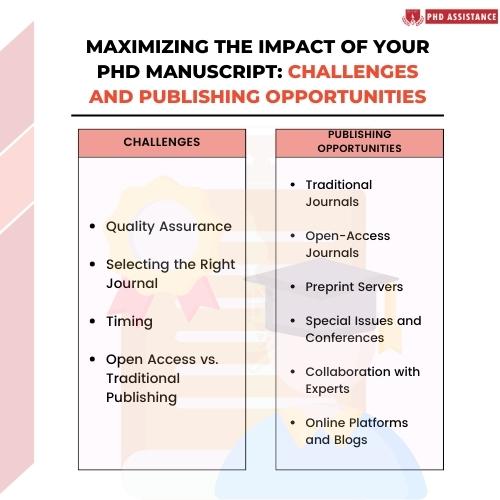Maximizing the Impact of Your PhD Manuscript: Challenges and Publishing Opportunities
Publishing while pursuing your PhD may be both rewarding and difficult. On the one hand, producing and publishing papers may be a valuable and crucial portion of your experience as a PhD student. It not only allows you to share your work with a larger audience, but it may also help you create your reputation in your profession, which may lead to future chances such as academic posts or financing. Publishing, on the other hand, may be a scary endeavour that adds an extra layer of pressure and workload to an already difficult curriculum, necessitating a tremendous amount of attention and determination.
Introduction
The Difficulty of Publishing While Pursuing Your PhD
Published journal articles during your PhD can be challenging and daunting. You compete with experienced researchers and face the challenge of producing the same papers as a student. Feedback during the peer review process can demoralize you, especially for PhD students. The publishing process is unfamiliar to many, and understanding the guidelines and expectations of different journals can be overwhelming. Additionally, understanding the review process can be challenging for new PhD students. Despite these challenges, publishing is an important aspect of the academic process, and it is essential to manage them effectively.

Check our PhD Manuscript examples to learn about how we review or edit an article for Manuscript.
Earning a Doctor of Philosophy (PhD) is a significant academic achievement, and one of the most important outcomes of this journey is the creation of a high-quality PhD manuscript. Your Ph.D. manuscript challenges for students represent years of research, hard work, and dedication. To maximize the impact of your manuscript, it’s essential to navigate the challenges and make informed decisions regarding its publication. In this article, we will explore the challenges you may encounter while publishing your PhD manuscript and highlight various publishing opportunities to ensure your research reaches a wide and influential audience.
Challenges:
- Quality Assurance: Ensuring the quality of your PhD manuscript is paramount. Rigorous peer review processes and constructive feedback from experts can be challenging to navigate. The manuscript in research must meet the highest academic standards and be free from errors, ensuring it contributes significantly to your field.
- Selecting the Right Journal: Choosing the right journal for your manuscript can be daunting. You must consider factors like the journal’s reputation, scope, and its intended audience. Selecting a journal that aligns with your research topic is crucial to reach the right readership.
- Timing: Timing is crucial in academic publishing. Delays can impact the relevance of your research. Balancing the need for a thorough review and timely publication is often challenging.
- Open Access vs. Traditional Publishing: Deciding whether to publish your manuscript in an open-access journal or through traditional publishing routes is a significant decision. Open access can enhance accessibility, but it may involve publication fees. Traditional publishing may have a broader readership but may limit access.
Publishing Opportunities:
- Traditional Journals: Traditional journals are an established route for publishing research. Choose a journal that aligns with your research field and has a strong impact factor. Be prepared for the peer review process and possible revisions.
- Open-Access Journals: Open-access journals offer wider accessibility, increasing the visibility of your work. However, you may need to consider publication fees. Seek reputable open-access journals for the best impact.
- Preprint Servers: Uploading your stages of manuscript publication to preprint servers before formal publication allows you to share your research design quickly with the global scientific community. Preprints facilitate feedback and early collaboration.
- Special Issues and Conferences: Consider submitting your work to special issues of journals or presenting it at academic conferences. These platforms can offer increased visibility, collaboration opportunities, and valuable feedback.
- Collaboration with Experts: Collaborating with established researchers in your field can enhance the visibility and impact of your work. Co-authoring with experts can provide valuable networking and credibility.
- Online Platforms and Blogs: Create a personal website or blog to share your research findings and insights. Engaging with a broader online audience can help disseminate your work and increase its impact.
To Overcome the Publishing Difficulties during Your PhD
Learning about and adjusting to the academic publication process is a time-consuming and difficult undertaking. In this section, we provide five suggestions to assist you in approaching your first publication(s):
(1) normalizing rejections.
(2) coauthoring.
(3) realizing that the more you write, the simpler it is to write.
(4) getting started early; and
(5) really considering where to publish.
Conclusion:
Publishing your PhD manuscript is a critical step in your PhD academic journey. While you will face challenges, choosing the right publishing opportunities can significantly impact your research’s reach and influence. It’s essential to balance quality, timing, and accessibility to ensure your hard work contributes meaningfully to your field and the broader academic community. Be open to various publishing options, as each may offer unique advantages for maximizing the impact of your research.
Check out our study guide to learn more about the tips for writing a manuscript for a PhD
About PhD Assistance
At PhD Assistance, our PhD professionals provide end-to-end services, including rewriting your manuscript based on your thoughts and suggestions, using statistics and programming, editing and proofreading, formatting in accordance with journal style, and ultimately submitting. Our expert and experienced team members are highly knowledgeable in diverse research topics and have successfully managed these issues several times throughout the writing of dissertations for countless PhD candidates.
 Previous Post
Previous Post
